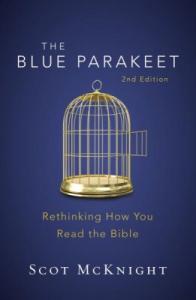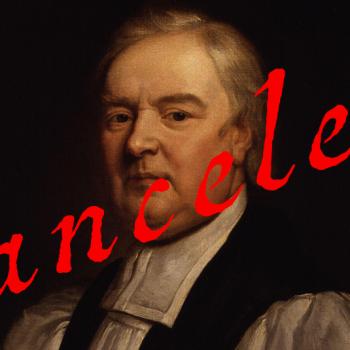Two years ago last Friday, I got an email from John Turner inviting me to become the new blogmeister of The Anxious Bench. I was excited to join the AB community, but also to come to Patheos.
See, long before I blogged at Patheos, I read blogs at Patheos. In fact, no one did more to inspire my own foray into blogging than Scot McKnight, whose Patheos-hosted Jesus Creed is still at the top of my Feedly list, and John Fea, who used to write a column for Patheos and then helped to found The Anxious Bench. To this day, one of my favorite theologians in the blogosphere is Roger Olson, who has been sharing his “evangelical Arminian theological musings” at Patheos for several years now. With my now-colleagues on the Bench, these Patheos bloggers helped me see a way for Christian scholars to reach the public.
Perhaps most of all, I was impressed that Patheos recruited Warren Throckmorton in 2013. A psychology professor at a conservative Christian college who has publicly rethought his views on sexual identity therapy, Warren is even better known for his investigations of popular evangelical figures like David Barton and Mark Driscoll. That Patheos’ Evangelical channel would host someone as unflinchingly honest and potentially controversial as Warren spoke volumes to me as I considered the Anxious Bench offer. This was a “big tent” evangelicalism, open to self-criticism and dissent and not afraid to challenge readers.
So I was troubled to learn that Patheos abruptly ended Warren’s blog last month, for reasons that remain somewhat mysterious. Warren first reported that he was simply told that his blog no longer met the “strategic objectives” of Patheos, then later shared part of an email sent by Patheos content director Phil Fox Rose to some Patheos bloggers:
As some of you know, Patheos decided to end its partnership with Warren Throckmorton. This was done after long and thoughtful consideration. The decision was not made based on a triggering event or post, and Mr. Throckmorton was advised of our expectations many months ago. This is not reflective of some change in policy. It was a specific case. This decision should not give any blogger reason to think their status is in question. We’re sorry the lack of details allows for speculation, but our commitment remains as always to be the place where conversation about faith is happening in the most robust and dynamic way.
I didn’t receive that email, but that’s probably because I had already reached out to our channel editor, Bart Gingerich. He reassured us that Patheos values what we do at The Anxious Bench and remains committed to hosting not only a variety of channels, but a variety of opinions within those channels.
It didn’t (couldn’t?) shed much more light on what happened to Warren, but what Bart wrote did fit with my experience here. Concerned as I am by the political connections of Patheos’ parent company (see Kristin’s post this morning), our editor has never questioned, let alone censored, any of our posts critical of Donald Trump or the “court evangelicals” attached to him. I didn’t sign up for Patheos hoping to share a channel with Mark Driscoll, but I’m glad to be part of a blog that regularly asks evangelical readers to question the abuse and marginalization of women by him and other prominent evangelicals.
If anything, I expect Anxious Bench to say even more about such issues in the months to come.
But at the end of the day, “the lack of details” about Warren’s case do allow “for speculation,” and I can’t fail to wonder if Patheos can be “the place where conversation about faith is happening in the most robust and dynamic way.”

When Scot McKnight left BeliefNet in September 2010, he explained that Patheos was “shaped for conversation about religious and theological topics…” Indeed, “hosting the conversation on faith” has long been the Patheos mission:
Patheos brings together faith communities, academics, and the broader public into a single environment, and is the place where many people turn on a regular basis for insight, inspiration, and stimulating discussion.
Much as I was drawn to Patheos by the chance to share a platform with like-minded bloggers from the academy and the church, I also wanted to be at a place where my own assumptions would be questioned and my own conclusions critiqued. To cite but a few examples of Patheos bloggers who push me intellectually and spiritually:
- It’s rarely pleasant to be the target of his energies, but D.G. Hart is a skilled historian who asks tough questions, not only of my own wing of evangelicalism but of the very notion of “evangelicalism” itself.
- George Yancey is always thought-provoking, especially on race and politics… and in his recent posts on rejoining his Southern Baptist tradition in the middle of the Paige Patterson scandal.
- My favorite new blog at Patheos Evangelical is Digital Wisdom, at which Michael Paulus and others contend that the “resources of the Christian tradition can help us move from a position of digital naiveté toward one of digital wisdom.”
- Over at the Progressive channel, Benjamin Corey, Fred Clark. and Morgan Guyton have been especially important in helping me see evangelicalism from the point of view of those who have left it. (Fred and Morgan have written critically about Warren’s dismissal.)
- And I’m glad that the “conversation on faith” includes nonreligious voices like Hemant Mehta, whose Friendly Atheist blog often makes usefully uncomfortable observations about evangelicalism in particular and Christianity more generally.
I hope that Patheos continues to host such a diversity of voices, across and within channels, but I think it’s fair for Kristin to ask whether Warren’s termination signals that Patheos “will be hosting a censored, invitation-only conversation? Are there topics we would do well to avoid?”
But even if we get more details and stronger reassurance, I’ve got a separate concern that’s been on my mind for several months now: that Patheos doesn’t host a conversation so much as a cacophony.
Go to www.patheos.com and you can find any number of voices speaking — but only rarely to each other. With the notable exceptions of Hart, McKnight, and Progressive blogger James McGrath, I rarely get the sense that other Patheos bloggers are all that interested in what The Anxious Bench has to say. But I’m guilty of this, too: as often as I find myself reading other Patheos blogs, I rarely write posts in response to them — whether to agree, disagree, or simply provide historical context.
Then there are the individual blogs themselves, which may not be the forums for conversation that we hope. Scot has spent a decade building Jesus Creed into a genuine community where the comments section often improves on the original post. But most bloggers I know find it too exhausting and frustrating to engage with reader commentary that is sometimes constructive (thanks to Salvatore Luiso, Stefan Stackhouse, and our other AB regulars!), sometimes destructive, and most often non-existent. I’d guess that the overwhelming majority of my Anxious Bench posts (especially those that are more clearly historical in focus) have received fewer than two comments. And I’ve only had two readers email me in two years of blogging here.
Cacophonies have their uses. It’s valuable just to be reminded of the sheer variety of religious expression and belief (and disbelief) in America. And I enjoy that people might come to Patheos to listen to one voice, then overhear another they might never have encountered otherwise. So I’m glad for the work that Bart and other editors do in curating content here, at the website, on social media, and through the email newsletters. All things considered, I’d certainly rather hear a cacophony coming from Patheos than for individual channels (let alone the entire platform) to start speaking in unison.
A society as polarized as ours badly needs a more robust “conversation on faith.” But that can’t happen if people largely speak past each other, any more than if they feel like they can’t speak at all.













